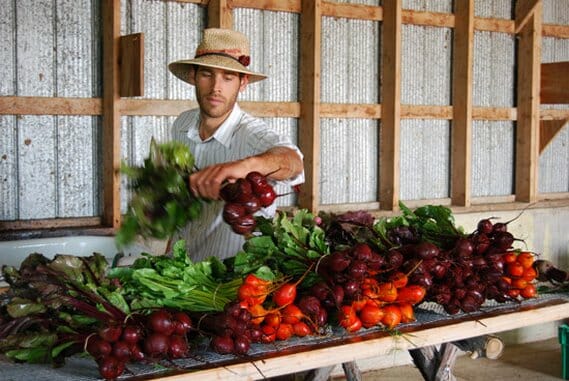
When Tarrah Young, one of the featured protagonists in Steven Suderman’s documentary, To Make a Farm, is asked if she would consider herself a “back-to-the-lander,” she shrugs the question off. “It’s a derogatory term,” she says and continues to dig through her bucket of dirt. (“Back-to-the-lander” was a term used in the ’60s to describe hippies who fled the city to start small scale farms.) “I associate it with naiveté,” she continues. But then the comparisons start to roll in: she’s from the suburbs, she wasn’t raised in a farming family, her motives are idealistic. “Oh God …. yeah!” she says with pained laughter.
If Young of Green Being farm isn’t a “back-to-the-lander,” then what exactly is she? Is she a hippie who thinks mucking through manure will save the world? Is she the reincarnation of Laura Ingalls Wilder? Is she a radical activist slowly bringing down corporate farming from her little corner of Canada? Or is she something altogether new?
These are the central questions raised in To Make a Farm. The film follows Tarrah and four other Canadian farmers as they struggle to eke out a living in the big world of small farming. Like Tarrah, all of Suderman’s subjects are new to the world of agriculture. They are idealistic, sensitive and unpretentiously poetic.
Though the threat of a ruined cabbage harvest might not sound incredibly exciting compared to a Tom Cruise movie, it seems very important once you’ve invested in the fate of these farmers. Which gets a thoughtful audience member thinking. What’s more important? The fate of Jack Reacher? Or the fate of a living thing meant for your plate? What’s more tangible than life? Than watching life grow?
But as To Make a Farm makes clear, life on the farm is not all Anne of Green Gables.
Suderman deftly balances his idealistic portrayal of farm life with its monotony and difficulty. Leslie and Jeff of Cedar Down Farm complain about the lack of recreational activities out in the country. During the harvest season, it’s nearly impossible, they say, to socialize or read or do anything, really, other than tend the crops. Tarrah agonizes over sending her pigs to slaughter (It’s like “sending your dogs to a terrible place to die”), and Wes of Little Path Farm has to live in a hut and poop in a hole.
If we take a step back from the narrative created by these farmers, we see that Suderman seeks to anchor his subjects in the context of contemporary agriculture. After five generations, Suderman’s own family was forced off their farm by corporate competitors. Small family farms have become almost extinct. Against this backdrop, the farmers of To Make a Farm seem even braver. Little Davids standing up to a massive Goliath.
Though Suderman doesn’t explicitly attack the evils of corporate farming, he does effectively show an alternative for how we might grow food as a nation. After all, as a country founded on family farms and homesteads, the fact that these institutions have all but vanished is not only sad—it has profoundly affected the health of the American population. Obesity, heart disease, diabetes are all symptoms of a system that pumps its population full of unhealthy food.
Though quiet and contemplative, To Make a Farm provides its viewers plenty of food for thought.
Director: Steven Suderman
Starring: Tarrah Young, Nathan Carey, Jeff Boesch, Leslie Moskovits, Wes Huyghe
Release Date: n/a